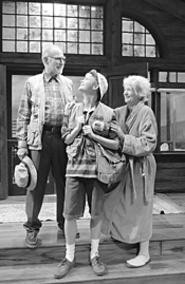The Cleveland Play House may not be aware of this, but edgy family drama is not in short supply these days. On Broadway, the domestic disturbance du jour is a play about a man who's getting it on with a goat. The Tony Award winner ends with a cuckolded Sally Field slaughtering her husband's horned lover, then dragging its bloody carcass across the stage. It's a slightly extreme examination of love and family, sure, but the Play House -- whose latest selection is the middle-of-the-road On Golden Pond -- might well consider taking such a risk.
Frankly, the dysfunctional Thayer family portrayed in Ernest Thompson's 1979 drama is pretty mundane, as you may recall from the movie -- although at least that version offered the voyeuristic thrill of watching Henry and Jane Fonda work through their issues onscreen, making the relationship between patriarch Norman and daughter Chelsea as nonfictional as it was nonfunctional.
The play, like the film, is apolitical, safe, bestiality-free -- as sentimental and intellectually challenging as a Hallmark card commercial. Fortunately, it's also genuinely touching and almost heartbreakingly cute. It's a sharp, tight, funny script about an endearingly crabby couple who have managed to stay together and in love for 49 years, spending summers in their retreat on the pond, watching Mr. and Mrs. Loon through binoculars as their waterfowl counterparts make weather predictions and make out. It is this relationship that is the play's cornerstone -- and miracle, particularly now, in the age of goat love.
And it is the warmth and chemistry of Mike Hartman as Norman and Darrie Lawrence as wife Ethel that make the play worth seeing. If there were an MTV Movie Awards-esque show -- with its frivolous categories like "Best Explosion" and "Best Acting Debut by a Rap Artist" -- in honor of Cleveland theater, a serious contender for "best kiss" should be the duo's embrace near the play's conclusion. It's a dear and believable moment, giving some credence to the Play House's repeated claims that nurturing a stable of associate artists (Hartman among them) builds working chemistry that ultimately benefits audiences.
But beyond the romance of the elders, the play leaves something to be desired. The stage version lacks some of the drama of the film because the relationship between patriarch Norman and his somewhat unlikable daughter Chelsea (played by Kate Levy) is given far less attention. Because Chelsea doesn't have enough stage time to build her case, she appears merely whiny. In fact, she is the only character who seems to bristle at her father's biting yet ultimately harmless mind games.
The casting of Chelsea doesn't help. Flat and unsympathetic, Levy fails at unearthing whatever vulnerability or intelligence Thompson may have written into the character. The film version much more successfully renders the pain of feeling unloved by such a mammoth familial presence and shows the ways in which Chelsea literally will do back flips to gain his attention.
Fortunately, in the pivotal role of Norman, Mike Hartman kills. The character is brilliantly written -- as charming and tart a crabapple as you're likely to find onstage. Nonetheless, the actor deserves props for a seemingly effortless performance in which he brings Norman's abundant humor and humanity to crackling life. At the risk of getting hyperbolic, you may wish you could invite good old Norman to your Thanksgiving dinner to talk sports, current events, sucking face, and cruising for chicks.
For most of us, our actual lives fall somewhere between goat-schtupping and an idyllic New England retirement. Forgive the shameless sentiment (sniff), but this production makes it almost seem possible to aspire to the latter.


